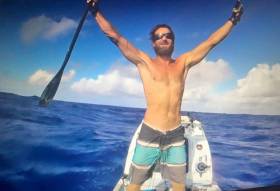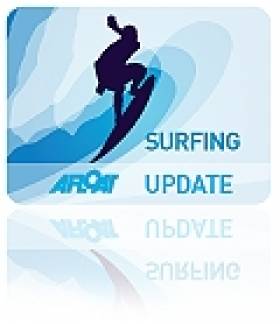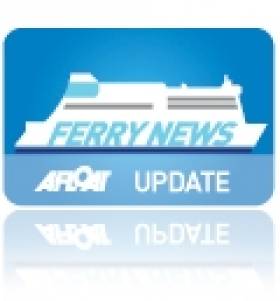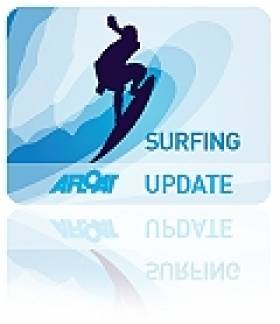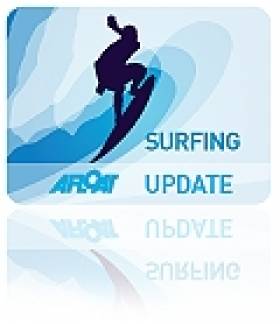Displaying items by tag: SUP
#SUP - South African adventurer Chris Bertish has become the first man to cross the Atlantic by stand-up paddleboard, as the Guardian reports.
The big wave surfer took 93 days to traverse the ocean from Agadir in Morocco to Antigua, where Ireland’s ocean rower Gavan Hennigan set his own transatlantic record in January.
That effort required Bertish, 42, to paddle some 43 miles a day on his custom 20ft expedition paddleboard designed by Phil Morrison, the naval architect also responsible for the latest National 18 design.
The Guardian has more on the story HERE.
Free Stand Up Paddle (SUP) Weekend For Women at the National Yacht Club, Dun Laoghaire
#surfing – The Irish Surfing Association (ISA) is planning to introduce up to 500 girls and women to Stand Up Paddle, one of the world's fastest growing water sports, at a weekend for women on the 10/11 May at one of Ireland's leadng yacht clubs, the National Yacht Club in Dun Laoghaire.
Stand Up Paddle or SUP is an ancient discipline of surfing that has re-emerged in recent years and is taking the world by storm. SUP can be enjoyed by everyone. Learning the basics is physically less demanding then surfing and it does not require waves to get going, therefore can be enjoyed on calm water.
The weekend is free. A team of all-female instructors will be on hand and all equipment required to get going will be supplied. Participants will only need bring a towel and swimming suit.
Our Stand Up Paddle weekend is hosted under the Women in Sport Initiative, run by the Irish Sports Council, to encourage more Irish women to participate in sport, and supported by the National Yacht Club.
For further information and booking contact-
Zoё Lally, Development Officer, Irish Surfing Association LTD, Easkey Surfing & Information Centre, Easkey, Co Sligo, Ireland Tel: Office: 096 49428 Mobile: 087 2333789
Calling Cherbourg: All Things Nauting
#FERRY SAILS – Ferry passengers perhaps on a mini-wine break cruise between Rosslare-Cherbourg may be taking a detour to the Cherbourg Nauting Boat Show which is been held this weekend, writes Jehan Ashmore.
Both Celtic Link Ferries and Irish Ferries operate on the continental route to the man-made Norman port originally constructed by Napoleon. The present day bustling town-centre of Cherbourg-Octeville to give its full name is close to the large 1500-plus berth marina at the Port Chantereyne which is hosting the show.
Those attending can buy and sell new and second-hand boats and where there will be exhibitors attending the three-day show which started yesterday. Activities include scuba-diving, dry surf, stand-up-paddle and model-boats on a dedicated pool.
In addition there is a guided-tour on a racing-boat commented by its skipper Eric D'Hooghe from the Figaro Race. Also making an appearance is the French rower Rémy Alnet who will be there to talk about his trans-Atlantic races.
Also on a related note is the La Cité de la Mer which is a museum situated in the former trans-Atlantic liner passenger terminal used during the so called golden era. The history of these liners is recalled in the museum and of course includes the RMS Titanic and the French Line's famous France which as the Norway made a once off anchorage call outside Dun Laoghaire Harbour.
In addition there are displays of submarines including the decomissioned French Navy nuclear-powered submarine Le Redoutable which is located in an adjoining dry-dock.
- Ferry news
- Cherbourg Nauting
- Napoleon Port of Cherbourg
- Port de Cherbourg
- Cite de la Mer
- CherbourgOcteville
- RosslareCherbourg
- Port Chantereyne marina
- Celtic Liink Ferries
- Irish Ferries
- WineBreak Mini Cruises
- Scubadiving
- DrySurfing
- standup paddle
- SUP
- ModelBoats
- New Boats
- SecondHand Boats
- TransAtlantic Liners
- Le Redoutable submarine
- French Navy
- RMS Titanic
- French Line's France
- Cruiseship Norway
- Dun Laoghaire Harbour
- Dun Laoghaire Harbour cruise liner calls
- Dun Laoghaire Harbour Norway anchorage call
- Cruiseships
- Cruiseliners
- Figaro Race
- Eric D'Hooghe
- French rower Remy Alnet
- Remy Alnet
- La Cité de la Mer
Irish 'Happy to Be a Part' of First SUP and Paddleboard Worlds
#SURFING - Team Australia proved that when it comes to watersports, they're a step above most of the competition at the inaugural ISA World Stand-Up Paddle (SUP) and Paddleboard Championships in Lima, Peru recently.
The paddleboarding duo of Brad Gaul and Jordan Mercer each won three gold medals, along with the team gold medal and the perpetual Club Waikiki Trophy, which will be awarded to the overall team champion every year.
But for every powerhouse team like Australia, the USA and South Africa, there were teams like Ireland who arrived at the world championships to represent themselves well, but also to be able to say they were there for the beginning of something big.
"The event was just amazing, such a positive vibe amongst all the competitors, everybody that we met from local organizers to everyone at our hotel or the drivers," said Finn Mullen, who competed along with teammates Dave Owens, Paul Byrne, Ed O'Farrell, Keith Gorman and Jane Downes.
"They were all so stoked to have the contest and see us all here," Mullen added "and there was like this amazingly friendly vibe in the water, because really they were being super gracious to us, giving us the break for the entire week, and they couldn't be more accommodating and I couldn't me more happy that I was able to be a part of it."
Irish Six in Peru for SUP and Paddleboard Worlds
#SURFING - A six-strong Irish team is in Peru to compete in the inaugural World Stand-Up Paddle and Paddleboarding Championships, which commence today (19 February).
The surfers have travelled at their own expense to the Peruvian capital Lima to take part in the International Surfing Association-sanctioned event, where they will contest against paddleboarders from 19 other countries.
“It is the first of its kind and we wouldn’t want to miss out," team member Paul Byrne told TheScore.ie. "The fact that it has been recognised enough to hold an international competition means stand-up padding (SUP) is here to stay.”
Dubliner Byrne first got involved in SUP in Australia, and found on his return to Ireland that he and his friends didn't need to seek out the popular surf out west to keep up with the sport - the swell produced by ferries in Dublin Port is just what they needed (see video of Dave Owens above).
Byrne joins Owens, Finn Mullen, Ed O'Farrell, Keith Gorman and Jane Downes in South America for the World Championships, which run till 25 February.
“We been competing in Europe," he says, "but it is sure to be tough against surfers who are sponsored to do it for a living.”



























